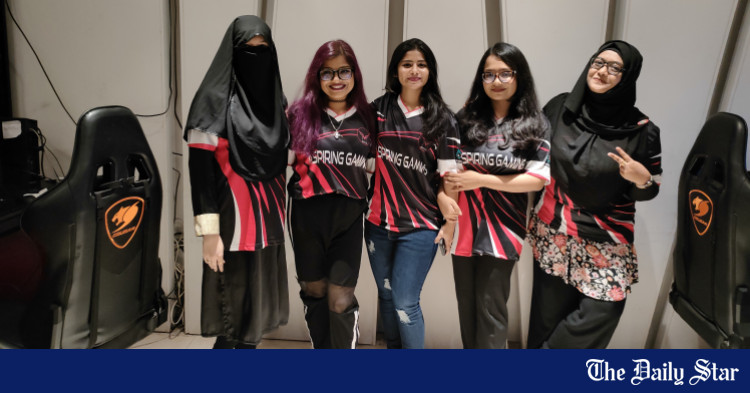The Bangladesh esports gaming scene has reached a new milestone, as for the first time in history, an all-female team is representing Bangladesh in the official esports tournament ‘Global Esports Games 2022’, competing at Dota 2.
The members of the team are Nushin ‘Mirajane’ Reza (captain), Anika ‘Nooblet’ Tabassum Medha, Aushnandrilla ‘Bombastic Potato’ Saha, Tasneem ‘Legal Girl’ Taufiq, Subrima ‘SunShine’ Sumiya. The coach of this team is Sadman ‘Jimmy’ Abidur Rahman.
The Global Esports Federation and Bangladesh Youth Development and Electronic Sports Association (BYDESA) collaborated to host the Dota 2 women’s national team tryout for Bangladesh. On September 26, the event was held in Auroral Gaming Lounge, in which ‘Team Mayhem’ was chosen to represent Bangladesh after winning the audition.
The team faces Team Singapore and Team Sri Lanka in the South Asia group stage of Global Esports Games 2022, in hopes of making the playoffs. The final rounds of this competition will be held in Istanbul, Turkey, from December 14-18, 2022.
The team is dynamic, ranging from A-levels completing students to university graduates. Yet, regardless of their differences, they have come together for their shared love of esports. The team captain, Nushin, an undergraduate student, remarked, “It is our passion for the game that has helped us stick together regardless of our ups and downs.” She explained that although the male Dota 2 team of Bangladesh was doing quite well, the female team was still struggling for various reasons – and they wanted to combat these barriers together.
Medha, who streams her games on Facebook, has deep-rooted connections to the world of gaming. “Gaming is a lifestyle for me. I even met my husband through gaming over the years, so it carries a strong significance in my life,” she shared. Her family has other gamers too, and they often play together.
Aushnandrilla, the team’s youngest member who recently completed her A-levels, spoke about how she started gaming. “I’ve been playing Dota 2 for 6 years now. At first, I did not like the graphics as much, but now I love every aspect of the game.” Aushnandrilla wants to become a professional gamer and pursue her education abroad, where she can also pursue gaming with better supporting infrastructure.
“I have known these girls through the game. Having played countless matches together, I think one of our biggest strengths is how we respect, accept and adjust to each other despite each of our flaws,” shared Tasneem, another team member.
Subrima, who has completed her Bachelors, also started playing in 2016. She has played many other games, but Dota 2 is currently her favourite. Although she was unable to continue playing games for two years, she is delighted that all of their hard work is finally paying off.
Regarding preparation, the team commented that there have been many challenges in the way. “As we live in different areas, the area-wise scheduled power cuts have been a massive barrier for us during preparation,” shared Nushin. “Regardless,” she said, “the team is trying to constantly improve with regular practice – playing in both teams and solo to hone our skills further.”
The path to reaching this stage was not easy for the team. “Almost all of us have been told at different times and places – why should women play competitive video games?” stated Medha. Other team members also share similar stories, where they have faced barriers from parents, family members and society as a whole. Nushin added that barriers also exist for male esports gamers in Bangladesh, but for female gamers, gender stereotyping and the conservative mentality of Bangladeshi society has made it even more challenging.
Another issue that frequently arises is the general inaccessibility of the required gear. Professional gaming gear tends to be expensive and significantly affects professional competition. Aushnandrilla shared that during the group stage matches, they suffered from insatiable and higher latency (ping), with the internet connection being as much as one-sixth of the efficiency of their competitors. Moreover, social stereotypes against gaming as a whole make it difficult for the team to access expensive gaming gear as families hesitate to invest so much money into video gaming.
Aside from societal and technical barriers, the team also faces many personal challenges as they must constantly strike a balance between other aspects of life and gaming. Nushin shared that while it’s true that talent helps in the game, even for the most talented players, there is no alternative to constant practice. Aushnandrilla, for instance, played games for as much as 15 hours a day regularly while grinding her gaming skills. The dedication of other players amounts to similar hours per day as well.
In pursuing professional esports gaming, the team expressed frustration as there is limited scope currently available in this country. “In Bangladesh, professional gaming careers for females are challenging to pursue due to lack of funding,” shared Medha. According to her, most Bangladeshis do not understand the market of esports gaming and shy away from investing in it. However, the team is hopeful that by representing Bangladesh as an all-female team on the world stage, the visibility of local female gamers and the untapped potential will open doors for the next generation.
“We hope that women gamers from Bangladesh will have a sustainable platform through which they can pursue professional gaming in the future. We look forward to that future and are always willing to contribute towards it,” Nushin shared encouraging words – hopeful about the future of female esports in Bangladesh.
